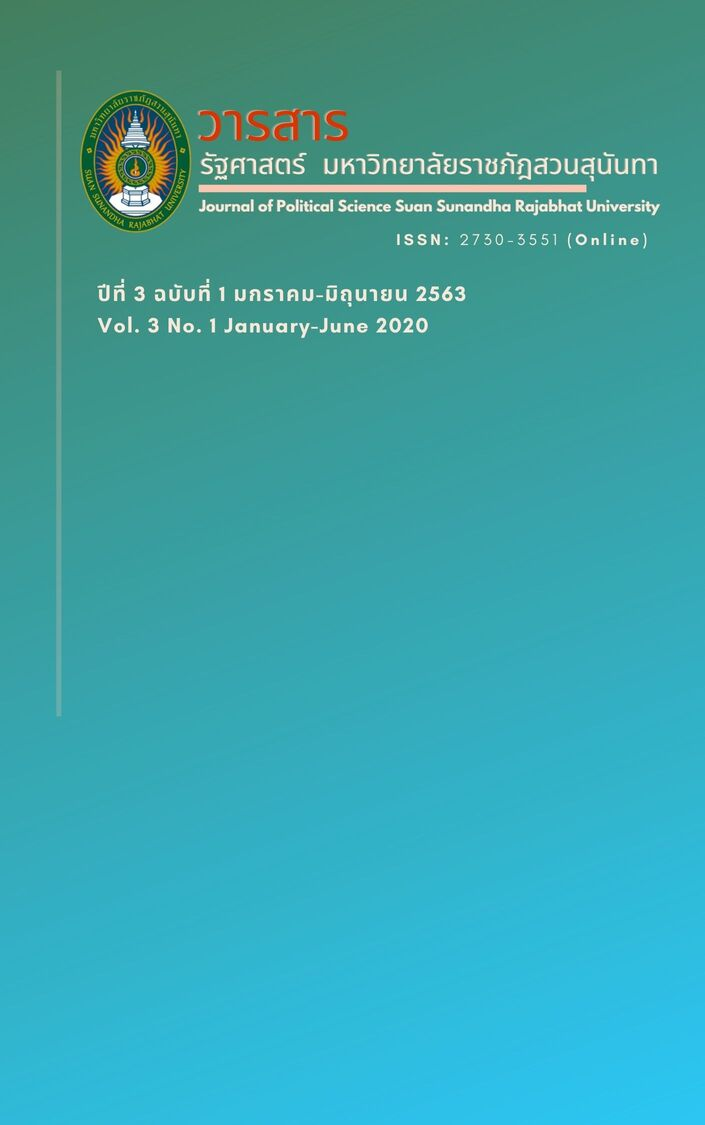สมรรถนะที่จำเป็นต่อการประกอบวิชาชีพของบัณฑิต คณะบริหารธุรกิจ ภาควิชาการเงินและการธนาคาร
Main Article Content
บทคัดย่อ
การศึกษาในครั้งนี้มีวัตถุประสงค์เพื่อศึกษาสมรรถนะที่จำเป็นต่อการประกอบวิชาชีพของบัณฑิตคณะบริหารธุรกิจ ภาควิชาการเงินและการธนาคาร การวิจัยนี้เป็นการวิจัยเชิงคุณภาพ ใช้วิธีวิทยาแบบการสร้างทฤษฎีฐานรากซึ่งเป็นวิธีวิทยาหนึ่งของกระบวนทัศน์ทางเลือก เก็บรวบรวมข้อมูลด้วยการสัมภาษณ์เชิงลึก โดยใช้แนวคำถามการสัมภาษณ์แบบกึ่งโครงสร้าง และวิธีการสังเกตแบบไม่มีส่วนร่วม ผู้ให้ข้อมูลหลักจากความคิดเห็นของ 3 กลุ่ม ได้แก่ 1) กลุ่มผู้ประกอบการ 2) กลุ่มผู้บริหารในสถานประกอบการ และ 3) กลุ่มศิษย์เก่าที่สำเร็จการศึกษาและทำงานแล้ว รวม 15 คน ผลการวิเคราะห์ข้อมูลด้วยการสัมภาษณ์เชิงลึกเกี่ยวกับความหมายของสมรรถนะที่จำเป็นต่อการประกอบวิชาชีพของบัณฑิต ผลการวิจัยพบว่า สมรรถนะที่จำเป็นต่อการประกอบวิชาชีพของบัณฑิต คณะบริหารธุรกิจ ภาควิชาการเงินและการธนาคาร ประกอบด้วย 1) ความรู้ด้านการเงิน 2) มีทักษะในการแก้ปัญหาอย่างเป็นระบบ 3) มีการทำงานเป็นทีม 4) มีการใช้โปรแกรมสำเร็จรูปได้ดี และ 5) มีความซื่อสัตย์
Article Details
เอกสารอ้างอิง
ชัชวาล อรวงศ์ศุภทัต. (2552). การบริหารทรัพยากรมนุษย์ในยุคการแข่งขัน.สืบค้นเมื่อ 5 ตุลาคม 2560,
จากhttp://www.tpa.or.th/writer/read_this_book_topic.php?bookID=1302&read=true&
count=true
Boyatzis, R.E. (1982). The Competent Manager: A model of Effective Performance. New York: John Wiley and Sons Inc.
Charmaz, K. (2006). Constructing Grounded Theory. Thousand Oaks, CA: Sage Publications.
Chewapun, T. (2015). Performance of accounting staff in industrial factories in Nonthaburi. RMUTT Global Business and Economics Review, 10(2), 101-152.
Gary, H. & C.K. Prahalad. (1989).Collaborate with Your Competitors and Win. Harvard Business Review, 67(1), 133-139.
Jamieson, L. M. (1987). Competency-based approaches to sport management. Journal of Sport Management, 1(1), 48-56.
McClelland, D. C. (1973). Testing for competence rather than for intelligence. American Psychologist, 28(1), 1-14.
Office of the Higher Education Commission. (2015). Standard framework for higher education Accessible.Retrieved September 2, 2017, from http://www.mua.go.th/users/tqf-hed/news/ news6.php
Park T-Y, Cho S-H. and Seo J.H. (2006). A Compulsive Buying Case: A Qualitative Analysis By the Grounded Theory Method. Springer Science Business Media, 28, 239-249.
Positta, C. (2013). Science and art of qualitative research. Amarin Printing & Publishing: Bangkok.
Sirisomboon, P. (2016). Qualifications of graduates under the framework of the National Higher Education Certificate of the College of Southeast Bangkok. Retrieved on July 14, 2017. From http://www.southeast.ac. th/SBC_Journal/Jornal_main/11.pdf
Strauss, A. L. (1987). Qualitative Analysis for Social Scientists. New York: Cambridge University Press.
Strauss, A., and Corbin, J. (1990). Basics of Qualitative Research: Grounded Theory Procedures and Techniques. Newbury Park: SAGE.
Suksawat, J. (2016). The performance of accountants in the needs of entrepreneurs in the east (Master Thesis). Srinakarinwirot University.
Vanitbuncha, K. (2015). Structure Equation Model by AMOS. (1st Ed.). Bangkok: Chulalongkorn Printing.


